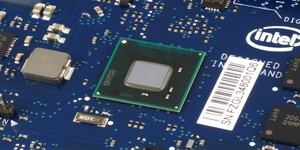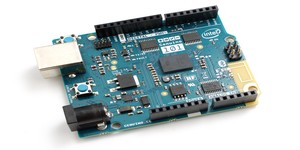Intel has proved that it is serious about taking on industry giant ARM in the embedded space with the announcement of the Intel Edison, a teeny-tiny computer no larger than an SD card.
Based on the company's latest dual-core x86-compatible Quark processor, the Intel Edison is an entire computer built into an SD card form factor. As well as the Quark, which handles operating system and heavy processing duties with full support for running Linux, the computer includes an on-board microcontroller for real-time IO operations along with both Wi-Fi and Bluetooth Low Energy connectivity.
The company has already provided prototype Edison units to customers, trotting out Rest Devices at its Consumer Electronics Show (CES) unveiling to demonstrate one of the first products to make use of the device: an all-in-one variant of its Mimo Baby smart clothing range, capable of doing away with the external Bluetooth-connected receiver required of the current model. The company also claimed to have reduced the size of its smart bottle warmer, which begins the warming process when the Mimo suit detects the baby is waking, by half through switching to the Edison platform.
Intel also used the event to push its chips as the logical choice for wearable computing, showing off a reference design for smart earbuds which monitor heart rate while also streaming audio, a smart headset which links to an always-on voice recognition system provided by Sensory Inc., and a wireless charging bowl accessory to quickly charge said headset. The company also announced a contest, dubbed the Make It Wearable Challenge, which will provide more than $1.3 million in prizes for developers who create wearable computing devices with a claimed first prize of $500,000 in cash.
During the keynote, Intel chief Brian Krzanich also announced that as of this year all his company's chips will be free from 'conflict minerals' mined under duress in the Democratic Republic of Congo. 'Two years ago, I told several colleagues that we needed a hard goal, a commitment to reasonably conclude that the metals used in our microprocessors are conflict-free,' Krzanich said. 'We felt an obligation to implement changes in our supply chain to ensure that our business and our products were not inadvertently funding human atrocities in the Democratic Republic of the Congo. Even though we have reached this milestone, it is just a start. We will continue our audits and resolve issues that are found.'
The Intel Edison will be launched in mid-2014, the company has claimed.
Based on the company's latest dual-core x86-compatible Quark processor, the Intel Edison is an entire computer built into an SD card form factor. As well as the Quark, which handles operating system and heavy processing duties with full support for running Linux, the computer includes an on-board microcontroller for real-time IO operations along with both Wi-Fi and Bluetooth Low Energy connectivity.
The company has already provided prototype Edison units to customers, trotting out Rest Devices at its Consumer Electronics Show (CES) unveiling to demonstrate one of the first products to make use of the device: an all-in-one variant of its Mimo Baby smart clothing range, capable of doing away with the external Bluetooth-connected receiver required of the current model. The company also claimed to have reduced the size of its smart bottle warmer, which begins the warming process when the Mimo suit detects the baby is waking, by half through switching to the Edison platform.
Intel also used the event to push its chips as the logical choice for wearable computing, showing off a reference design for smart earbuds which monitor heart rate while also streaming audio, a smart headset which links to an always-on voice recognition system provided by Sensory Inc., and a wireless charging bowl accessory to quickly charge said headset. The company also announced a contest, dubbed the Make It Wearable Challenge, which will provide more than $1.3 million in prizes for developers who create wearable computing devices with a claimed first prize of $500,000 in cash.
During the keynote, Intel chief Brian Krzanich also announced that as of this year all his company's chips will be free from 'conflict minerals' mined under duress in the Democratic Republic of Congo. 'Two years ago, I told several colleagues that we needed a hard goal, a commitment to reasonably conclude that the metals used in our microprocessors are conflict-free,' Krzanich said. 'We felt an obligation to implement changes in our supply chain to ensure that our business and our products were not inadvertently funding human atrocities in the Democratic Republic of the Congo. Even though we have reached this milestone, it is just a start. We will continue our audits and resolve issues that are found.'
The Intel Edison will be launched in mid-2014, the company has claimed.

MSI MPG Velox 100R Chassis Review
October 14 2021 | 15:04









Want to comment? Please log in.